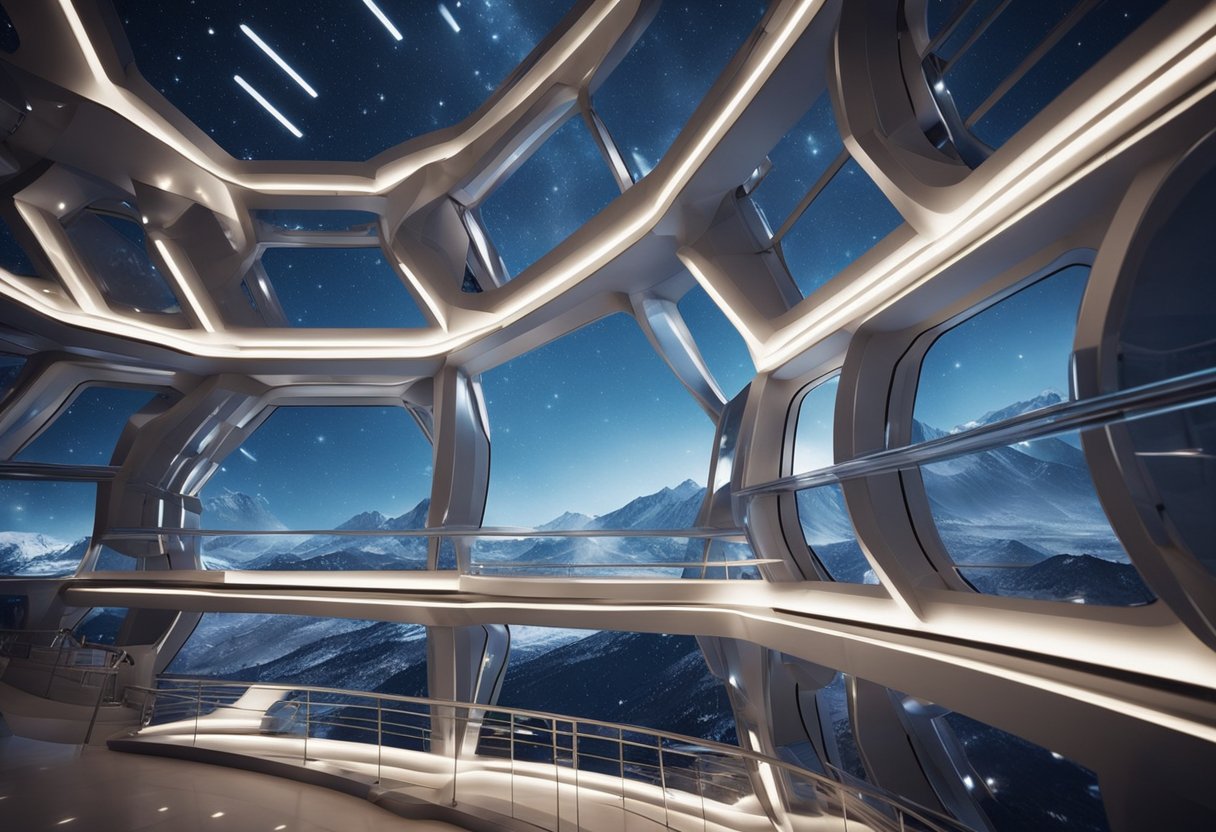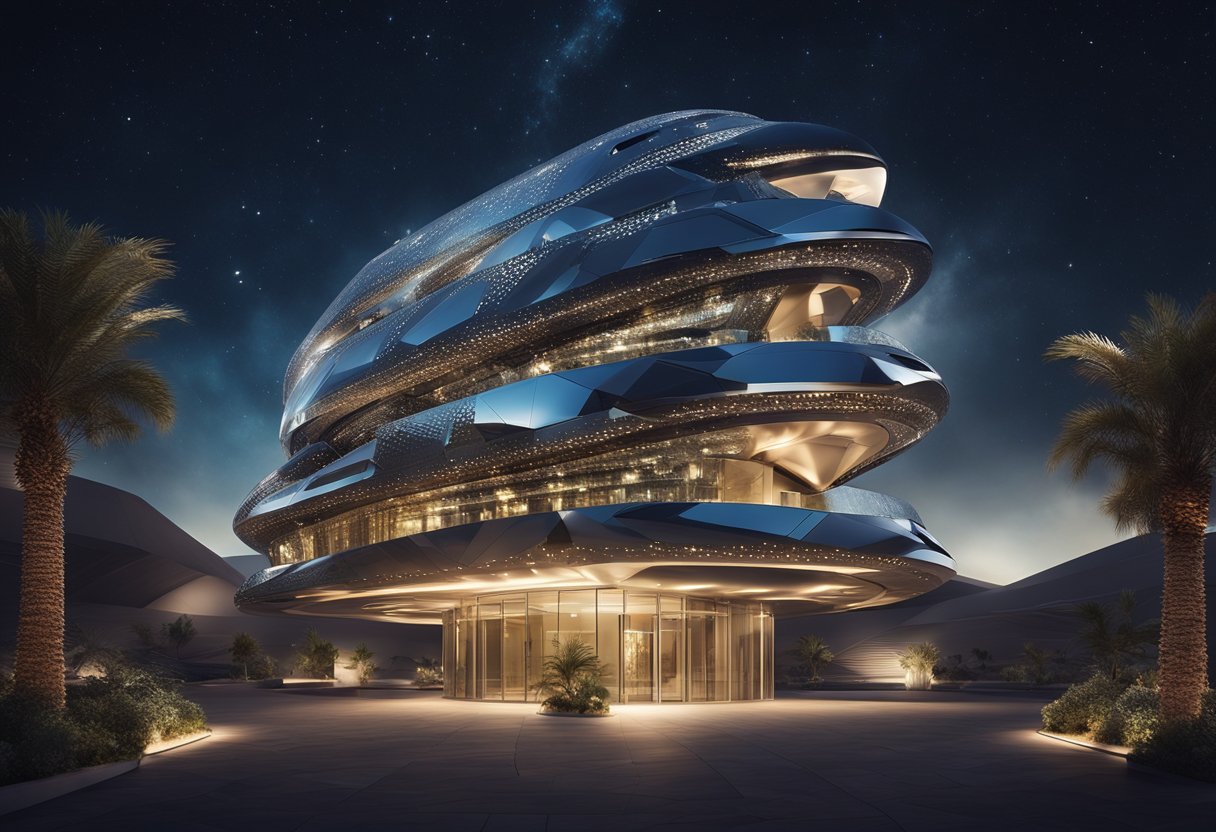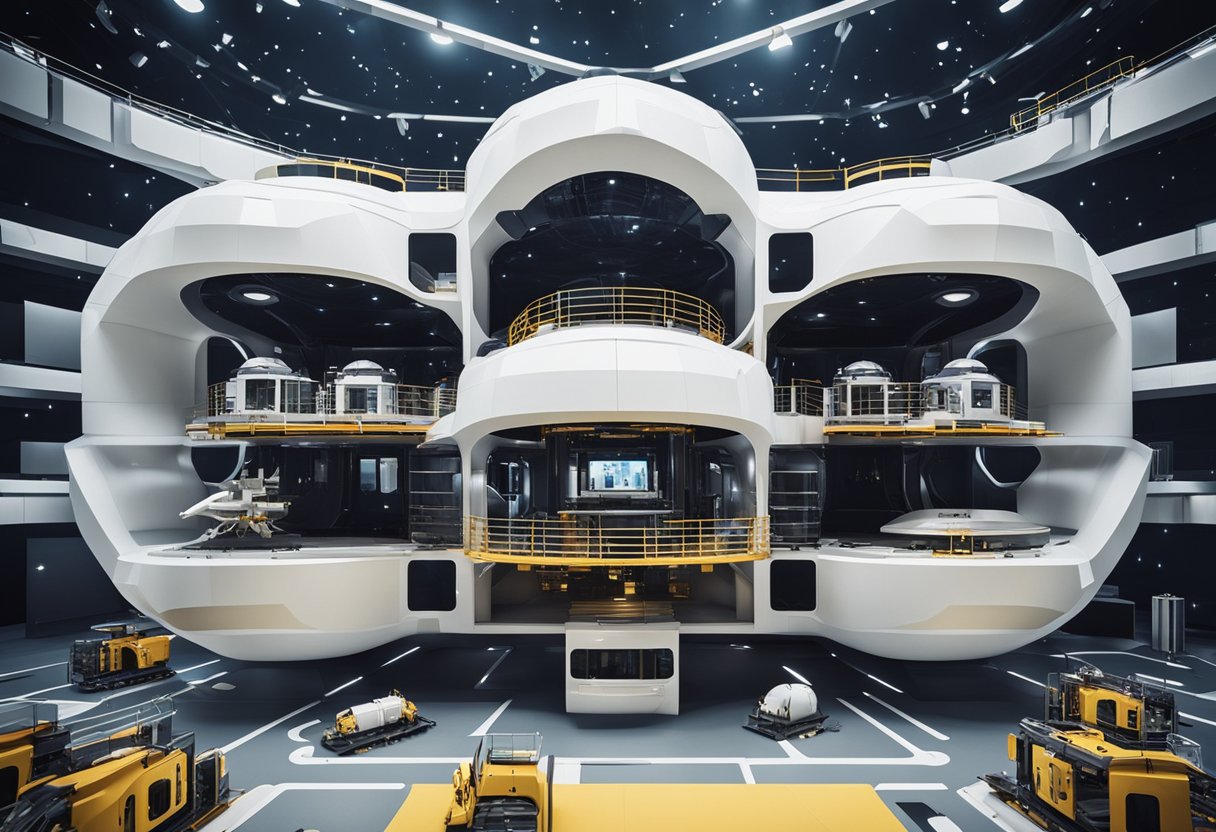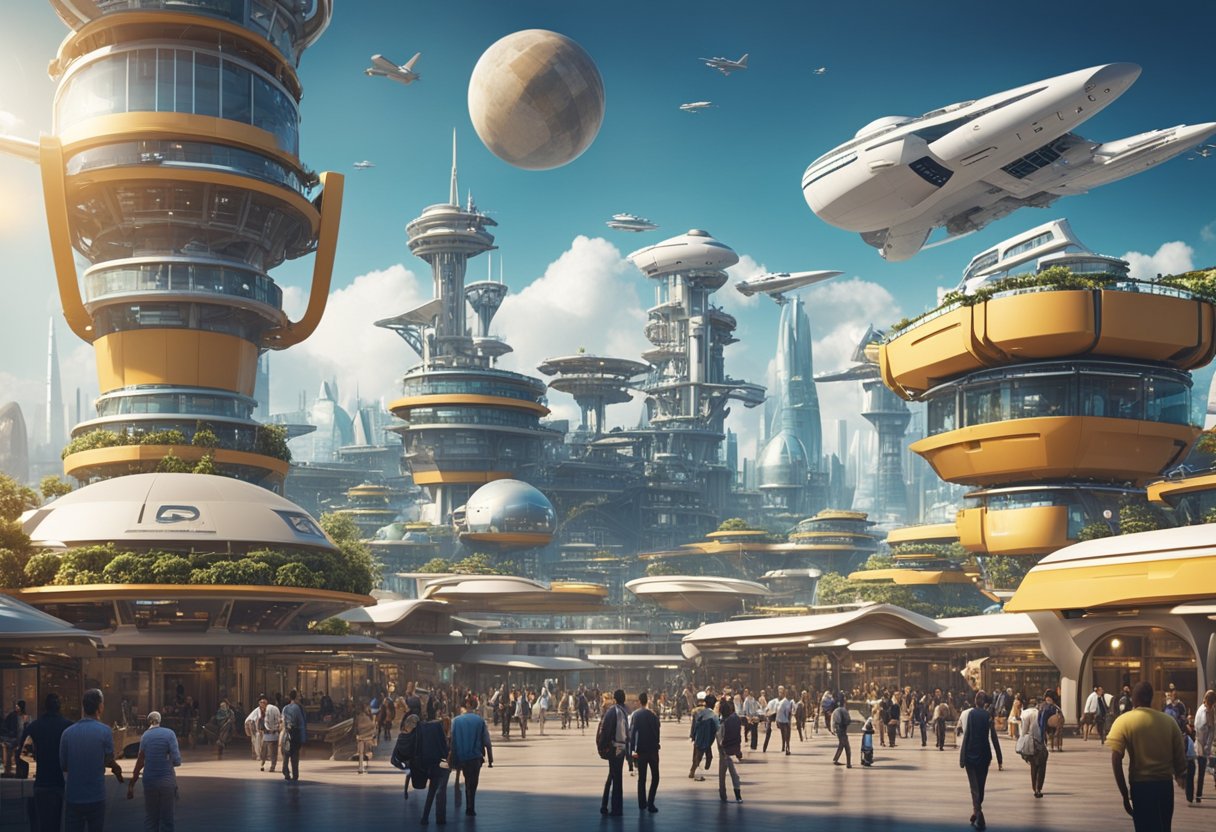
Space Hotel Development – As we enter a new era of space exploration, the concept of space hotels transitions from the pages of science fiction to architectural and engineering blueprints. With multiple companies announcing plans to open space hotels in the near future, this frontier is becoming increasingly tangible. Our fascination with space travel propels these developments as they promise to offer the public a glimpse of life among the stars.
These ventures push the boundaries of what is architecturally possible, creating structures that will not only withstand the harsh conditions of space but also provide comfort and luxury.

The engineering and design intricacies of constructing a space hotel are vast. They encompass the creation of artificial gravity through rotational designs and the development of life support systems that can sustain human life in the vacuum of space. The transportation to these hotels presents its own set of challenges and innovations, with companies like SpaceX being potential partners in shuttling guests to these off-world destinations. Safety remains a paramount concern, with rigorous standards and protocols to be established, ensuring that space tourism becomes a viable and regular activity.
Economic impact and market potential are significant, as space hotels represent a new category in luxury tourism with the potential to generate substantial revenue. Booking and reservations will likely become a complex process, factoring in the training and health requirements for space travel. As we progress, legal and ethical considerations will emerge, shaping the framework within which space tourism operates. The future of space hotels is bright, and we stand on the brink of opening the ultimate travel destination to humankind.
The burgeoning field of space tourism offers thrilling prospects, marked by the development of space hotels destined to break the mould of interstellar travel. Pioneering entities such as Orbital Assembly Corporation are crafting the foundation with their planned Voyager Station and Pioneer Stations.
We’ve witnessed an extraordinary transformation in space tourism from a mere futuristic fantasy to an imminent reality. Companies like SpaceVoyageVentures.com encapsulate this journey by documenting the evolution of space travel opportunities. Space tourism was an exclusive experience afforded by a handful of astronauts, but now it’s transitioning to an accessible luxury with the inception of the space hotel concept.
Space hotels and traditional space stations represent two distinct categories within space-bound habitats:
These hotels in space propose amenities and accommodations designed to make life in zero gravity exhilarating yet comfortable, a stark contrast to the utilitarian focus of traditional space stations.
As we explore the frontiers of space tourism, several ambitious projects have emerged, aiming to establish a human presence in orbit through luxurious accommodations. These ventures are spearheaded by companies such as Axiom Space, Orbital Assembly Corporation, and Blue Origin, each working on their unique vision for space hotels.
Axiom Space is pioneering efforts with its Axiom Station, an initiative that promises to expand the current International Space Station (ISS). The project is focused on constructing commercial modules for research, manufacturing, and habitation. It envisions a future where research teams, tourists, and professional astronauts can cohabitate in off-world accommodations.
The Voyager Station, developed by the Orbital Assembly Corporation, is set to become a trailblazer in the space tourism sector. Slated for a potential opening in 2025, this station aims to offer a unique experience with artificial gravity, luxury suites, and facilities that enable both leisure and work in space.
Pioneer Station represents Blue Origin’s ambitious plan for orbital habitat development. It shows our enticing vision for the future of hospitality beyond Earth’s atmosphere. While details about Pioneer Station’s timeline and specific offerings are not as widely publicised, Blue Origin’s track record with space technology makes us a significant player in this race to the stars.
Each candidate in the space hotel market brings us closer to a reality where space tourism is part of our everyday life, and where websites like SpaceVoyageVentures.com are the go-to resources for off-Earth adventures.

In the realm of celestial accommodation, architectural ingenuity must reconcile the demands of zero gravity with the expectations of luxury. We shall explore how space hotels are envisioned by architects, focusing on the necessity to adapt to zero gravity environments, the crafting of living spaces, and the integration of leisure amenities.
Designing architecture for a zero gravity environment requires a radical departure from terrestrial norms. Our visions of space habitats incorporate structures that permit free movement in all directions. Architect Tim Alatorre plays a pivotal role, meshing functionality with a sensation of home, though not as we know it on Earth. The utilisation of Velcro, magnetic boots, and handrails becomes fundamental in this innovative discipline, as depicted on SpaceVoyageVentures.com.
Living spaces, including luxury villas, are tailored to offer an unprecedented experience. Every villa is a masterstroke of engineering and opulence, crafted to ensure comfort while floating among the stars. Embracing the wonders outside, materials are chosen not just for their aesthetic appeal but also for their performance in a zero gravity scenario. The design ethos is to marry luxury with the extraterrestrial, pushing the boundaries of what a living space can be in the cosmos.
Our approach to recreational spaces extends to stellar bars and state-of-the-art gyms, all designed to operate in a weightless atmosphere. Exercise equipment is reimagined to provide resistance without gravity’s pull, allowing for workouts that are both functional and adapted to our guests’ physiology in space. Likewise, the bars invite patrons to imbibe and socialise in a setting that defies gravity – cocktails may literally float before your eyes, and social hubs become a fusion of science and conviviality.
In advancing the frontier of space travel, we are witnessing a significant shift in engineering and construction practices as these apply to off-world structures.
Orbital assembly represents a complex challenge, blending traditional engineering principles with an environment where every known variable may shift. Orbital Assembly Corporation is at the forefront, planning to commence construction of the 50,000-square-metre Voyager facility in 2026. The methodologies employed need to factor in microgravity conditions, radiation exposure, and materials’ behaviour in the vacuum of space. This results in a method that’s unlike any terrestrial construction, with components often needing to be lighter and more versatile to suit their cosmic journey and onsite assembly.
With robotics playing an essential role, our approach to space construction relies on precision and automation. Robotics in space construction not only improve safety by removing humans from the direct line of peril but also enhance efficiency and accuracy. The robotic systems we’re developing are specifically designed to handle the unique demands of space assembly, from navigating the harsh conditions to performing intricate construction tasks with precision.
By incorporating advancements in automation and remote operation, space construction companies are poised to make what once seemed like science fiction a tangible reality, as seen with impending projects like those listed on SpaceVoyageVentures.com. Through this combination of innovative orbital assembly techniques and the strategic use of robotics in construction, we are streamlining the process towards realising fully-functioning space hotels.
In the advent of space hotel development, two crucial elements that we’re focusing on are creating a viable artificial gravity environment and ensuring a sustainable life support system.
To simulate Earth-like gravity conditions, we utilise centrifugal force through the rotation of the habitation modules. The modules are designed to rotate around a central axis, generating a force outward that mimics the effects of gravity. This artificial gravity is fundamental in not only providing comfort but also maintaining the health of guests during their stay, counteracting the harmful effects of prolonged weightlessness.
Our space hotel’s life support system is engineered to sustain human life efficiently. We incorporate advanced recycling systems that convert waste into usable materials, providing a continuous supply of fresh air and water.
By consistently advancing our understanding of artificial gravity and life support technologies, we’re making space tourism more accessible. Our strategies are crafted with the utmost consideration for guest safety and environmental sustainability. Visit SpaceVoyageVentures.com for insights into the future of space travel, which includes these ground-breaking endeavours.

As we look to the stars for our next holiday destinations, transportation is a pivotal aspect of space tourism. Our journey to the orbiting accommodations like the proposed space hotels hinges on reliable and efficient space travel technology.
SpaceX has been at the forefront of pioneering space transportation with its Starship rocket, designed to carry humans beyond Earth. Starship is primed to revolutionise our travels to space by providing a reusable spacecraft capable of carrying passengers to destinations such as the eagerly anticipated space hotels. This innovation in space technology is paramount to making space tourism a reality, potentially offering trips to the Voyager station and beyond.
Our focus on cost and accessibility is crucial in transforming space travel from a dream to a reality for tourists. Currently, the ticket to space carries a hefty price tag, making it accessible only to the wealthiest individuals. However, through efforts like those seen at SpaceVoyageVentures.com, we are witnessing the democratization of space tourism, working towards more affordable options. As technology advances and the market expands, we expect the costs to become more attainable for a broader audience, opening doors to incredible space experiences.

As we progress towards the incredible reality of space hotels, safety and the associated risks are at the forefront of our operational planning. Our mission includes establishing robust emergency protocols and addressing health risks inherent to space travel. Our commitment is to ensure the safety of all astronauts and guests who will experience these pioneering voyages.
We have designed comprehensive emergency protocols to react swiftly and effectively to any situation. Every member of our spaceflight team is rigorously trained in these procedures, which encompass rapid evacuation, medical emergencies, and system failures. To minimise operational delays, these protocols are regularly reviewed and improved upon, incorporating lessons learned from past space missions.
Space travel exposes astronauts to unique health risks, including exposure to microgravity and radiation. Our preventive measures encompass regular health monitoring, tailored physical training programmes, and state-of-the-art protection gear. By staying apprised of the latest research and advancements, we aim to mitigate these risks for our guests, ensuring they enjoy a safe and memorable stay at the space hotel.
For further information on our safety measures and operational planning for space tourism, please visit SpaceVoyageVentures.com.
In considering the burgeoning sector of space hotel development, we recognise that meticulous attention to legal frameworks and ethical standards is imperative for the sustainability and acceptance of outer space tourism.
The regulatory apparatus for space tourism is an intricate tapestry, chiefly because it involves not only national oversight but also international collaboration. In the United States, the Federal Aviation Administration (FAA) is the key body governing commercial spaceflight. Companies keen on operating space hotels or tourism ventures must acquire the necessary licenses and permissions and ensure their vehicles adhere to rigorous safety standards.
We must also consider legislation crafted by international entities that apply to activities aboard the International Space Station (ISS), which has led to the establishment of principles guiding the peaceful use and access to outer space.
The legal system surrounding space tourism is underpinned by treaties such as the Outer Space Treaty of 1967. This cornerstone of space law, which includes input from entities like NASA, delineates the tenets of exploration and exploitation of outer space, including the lunar surface and other celestial bodies. Our approach to navigating these regulations is to ensure compliance with both national legislation and international standards.
Privacy and security are paramount for our guests aboard space hotels. We are committed to providing a secluded and secure environment, implementing stringent measures to protect personal data and physical well-being. While there isn’t a defined precedent for privacy rights in space, ethical considerations compel us to establish protocols akin to the stringent standards practised in the hospitality industry on Earth.
The challenges of ensuring privacy and security in the absence of established regulations are not trivial. We advocate for proactive engagement with stakeholders to develop a set of best practices that prioritise our guests’ safety without impinging on the thrilling experience of space tourism.
By integrating the insights outlined on SpaceVoyageVentures.com, we are at the vanguard of sculpting a responsible and ethical space tourism sector that prioritises legal compliance and ethical integrity. Our objective is to set benchmarks that not only meet but exceed the expectations of future space tourists.
In preparing for the imminent reality of space tourism, we are witnessing a surge in the development of space hotels, poised to revolutionise the experience of travel for future generations.
The race to establish accommodations in outer space has incited ambitious expansion plans for locations such as the moon. Organisations spearhead projects targeting lunar surfaces for potential sites, heralding an era where lunar retreats may become a reality within our lifetime. The prospect of gazing at Earth from a moon-based hotel is no longer relegated to science fiction but now sits firmly on the agenda of space hospitality ventures.
Our advancements in space technology propel the hospitality sector to new heights, with innovations aimed at ensuring comfort and safety. Space hotels are expected to feature rotational designs to simulate gravity, creating a more familiar environment for guests. Moreover, we are observing a significant investment in life-support systems, waste management, and leisure facilities designed for zero-gravity conditions. An upcoming space hotel scheduled to open in 2025 embodies this innovative spirit, promising amenities that merge the comfort of terrestrial hospitality with the novelties of space.
For those keen to follow these developments and possibly participate in this new frontier of travel, websites like SpaceVoyageVentures.com offer a gateway to understanding these forthcoming experiences. Here, one can explore current and nearly available space tourism options, keeping abreast of how close we truly are to vacationing among the stars.

Booking a space holiday is no longer a dream of the future, but an imminent reality. Our focus in this section is to guide you through the reservation process and explore the platforms that will be your gateway to the stars.
To secure your place aboard a heavenly retreat, first, you must navigate to a space tourism provider’s website. SpaceVoyageVentures.com is one such portal, documenting the array of journeys soon to be within your grasp. With your CNN account, you’ll have the benefit of pre-registration for upcoming slots, simplifying the process of logging in and out.
Reservations require meticulous planning and a substantial financial commitment. Typical steps involve:
Space holidays encapsulate vacation experiences that are out of this world, quite literally. As such, they demand early and careful planning.
The development of space hotel reservation platforms takes convenience to the next level. These platforms will operate similarly to Earth-based counterparts but with unique features tailored to space travel. Features like:
Remember, the prerequisite for using these platforms is a functional account, which you can create by providing requisite details and setting up security measures. Once registered, managing your reservations is hassle-free. Log in to view your booking status or log out after securing your voyage.
Heralding in this new epoch of travel, our role is to stay at the forefront, ensuring a transparent and seamless booking experience for all prospective space tourists.

Space hotel development signifies a remarkable blend of technology and tourism, promising significant economic benefits and market expansion. We’ll explore the direct involvement of billionaires in this novel industry and its potential to create jobs and bolster economies.
Billionaires such as Jeff Bezos and Elon Musk have been pivotal in propelling the space industry forward. Bezos’s Blue Origin and Musk’s SpaceX are not just about space exploration; their vision extends to establishing an off-planet hospitality experience. By investing heavily in space technology, these moguls have broadened the market potential for space hotels, attracting both attention and capital. Our collaborations with industry partners aim to leverage this momentum for the successful deployment of space-based accommodations.
The advent of space hotels is expected to create a cascade of economic opportunities. From aerospace engineers to hospitality staff, this burgeoning sector could potentially generate thousands of jobs. This isn’t just about high-tech positions; it encompasses a wide array of roles that will fuel local and regional economies. The space tourism market size, standing at USD 851.4 million in 2023, is anticipated to surge at a compound annual growth rate of nearly 49.9% from 2024 to 2030.
The construction and operation of space hotels will not only require a skilled workforce but also support industries such as manufacturing, logistics, and catering. We recognise our responsibility in shaping these new economic landscapes, ensuring a positive impact on job creation and community growth.
By examining various possibilities for space tourism, we’ve noticed an increasing appetite for this once-in-a-lifetime experience. It underscores the profound economic impact space hotel development has, from creating jobs to enhancing market potential, with billionaires driving the nascent industry’s rapid progression.
In this section, we answer the most pressing questions about the burgeoning space hotel industry, from ongoing projects to the expected costs of staying in an off-world resort.
Ongoing projects include the one scheduled to open in 2025, with a visionary design that promises an out-of-this-world experience for guests. Companies like Orbital Assembly are taking a leading role in these ventures, with proposed launch dates that are dependent on funding and successful testing.
The costs of developing a space hotel are astronomical, requiring significant investment in research, material, and technology. These can reach into the billions of dollars, considering the complexity and safety measures required for constructing a habitable structure in space.
Several enterprises are venturing into the construction of space hotels, including Orbital Assembly and private aerospace corporations. These companies are pioneering the field, combining advanced engineering and space travel expertise.
It is anticipated that staying in a space hotel by 2027 could cost passengers a premium fee, potentially ranging from hundreds of thousands to millions of dollars per night, reflecting the exclusivity and unique experience of a space sojourn.
The space tourism industry has garnered funding through private investments, partnerships, and pre-sales of future space travel experiences. Public interest and the prospect of a new frontier in travel have also spurred investment.
The main engineering challenges include creating a stable and safe structure that can sustain human life in the harsh environment of space. Solutions involve robust life support systems, innovative materials capable of withstanding space conditions, and modular construction techniques facilitating in-space assembly.